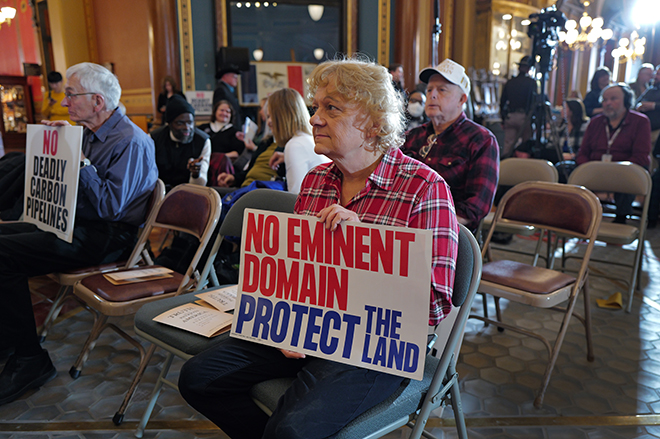Featured Topics
Featured Products
Events
S&P Global Offerings
Featured Topics
Featured Products
Events
S&P Global Offerings
Featured Topics
Featured Products
Events
S&P Global Offerings
Featured Topics
Featured Products
Events
Financial and Market intelligence
Fundamental & Alternative Datasets
Government & Defense
Professional Services
Banking & Capital Markets
Economy & Finance
Energy Transition & Sustainability
Technology & Innovation
Podcasts & Newsletters
Financial and Market intelligence
Fundamental & Alternative Datasets
Government & Defense
Professional Services
Banking & Capital Markets
Economy & Finance
Energy Transition & Sustainability
Technology & Innovation
Podcasts & Newsletters
16 May, 2025
By Siri Hedreen and Maya Weber

| CO2 pipeline protesters attend a presidential campaign rally in Des Moines, Iowa, in January 2024. |
A Republican-led bill would give federal regulators the power to site CO2 pipelines, conferring eminent domain rights, to the frustration of landowners in the Midwest who have been pushing for state regulations on carbon capture.
The permitting reform, advanced by the US House Energy and Commerce Committee on May 13, would expand the Federal Energy Regulatory Commission's jurisdiction to interstate and cross-border pipelines that carry CO2, hydrogen, oil and other commodities. The bill would also allow developers to expedite their permit applications by paying a $10 million fee.
"This would mark a step forward in streamlining the permitting process for critical energy infrastructure, ensuring that projects transporting hydrogen and CO2 can move forward under a unified federal framework," said Chris Psihoules, a senior counsel at law firm Norton Rose Fulbright who advises developers on FERC matters.
The proposal comes amid a flurry of CO2 pipeline development in the US Corn Belt, driven by federal subsidies for carbon capture and biofuels. The largest project, Summit Carbon Solutions LLC's roughly 2,500-mile pipeline network, would transport CO2 emissions from ethanol plants in five states to an underground storage site in North Dakota.
States versus feds
At present, CO2 pipelines are subject to a patchwork of state and county requirements. Many of these rules were created recently in response to carbon capture projects like Summit's, including a ban in South Dakota on eminent domain for CO2 pipelines.
The proposal still has many hurdles to overcome, including a key vote on the House's budget panel. Permitting provisions may also have to overcome challenges in the Senate over whether they are germane to a budget bill.
If passed, however, the legislation would preempt state and local law, Psihoules said.
The bill was swiftly condemned by advocacy groups, including Dakota Rural Action and Food & Water Watch.
"These measures would radically expand federal jurisdiction over all types of interstate pipelines, drastically limit public input, shorten environmental review timelines, and shield projects from legal challenges, all while clearing the way for expanded use of federal eminent domain against landowners," nearly 70 organizations wrote in a May 14 letter to Congress.
Summit did not respond to a request for comment on the House committee's bill.
Most of Summit's opposition has come from libertarian landowners who believe the developer's justification for the project — reducing CO2 emissions — is "a fraudulent argument," said Paul Blackburn, an attorney with the anti-pipeline group Bold Alliance.
"The idea that their land was going to be taken by state eminent domain authority for climate change outraged them," Blackburn said in a interview.
Summit has now secured siting permits in Iowa, Minnesota and North Dakota, leaving only South Dakota regulators left to convince. But the developer has encountered obstacles.
First, their initial permit application was denied. Then, after several failed attempts by the South Dakota legislature to ban eminent domain for CO2 pipelines, the state voted in new lawmakers who had campaigned on the issue.
In March, the lawmakers fulfilled that promise, forcing Summit to reconsider its route.
Meanwhile, the Iowa legislature recently passed a bill that would bar state regulators from renewing a permit for a CO2 pipeline, limiting its lifespan to 25 years. The bill would also change the definition of a common-carrier pipeline in a way could preclude CO2 pipelines from using eminent domain. Gov. Kim Reynolds (R) has yet to decide on the proposal.
"Now how do you think that these libertarians are going to feel about that entire state process and county process that they set up being repealed by federal law?" Blackburn asked.
Project impact
From a developer's standpoint, the House committee's bill would make the permitting process far more efficient and predictable, according to Psihoules. The new authority would allow FERC to permit interstate CO2 pipelines in the same manner as natural gas pipelines, which the agency has overseen for nearly a century.
"If passed, Congress is providing much-needed regulatory certainty for developers," Psihoules said.
The proposal could also encourage the development of interstate hydrogen pipelines, Psihoules added. Clean energy advocates see the infrastructure as key to a decarbonized economy, though Psihoules said he was not aware of any projects at the permitting stage.
A spokesperson for the Carbon Capture Coalition, an industry advocacy group, said the coalition's members are still reviewing the committee's proposal.
"As with all federal proposals, the Coalition operates by consensus, and we've not yet reached a position on specific elements of the budget reconciliation package," the spokesperson said in a May 15 email.
The head of FERC, however, appeared cool to the idea of the federal government assuming jurisdiction over new types of pipelines.
"The idea that, well, we don't like the fact that states get in the way on permitting — I don't personally buy that," Chairman Mark Christie told reporters on May 15.